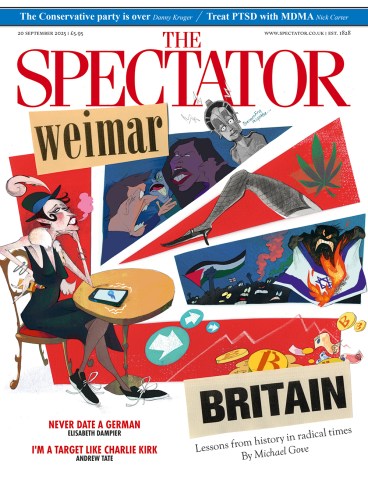
‘The Conservative party is over.’ Until recently, such talk could be dismissed in Westminster as typical Nigel Farage hyperbole. But the decision of Danny Kruger to defect to Reform UK this week has left some Tories wondering if their party’s condition is fatal. Kruger – MP for East Wiltshire since 2019 – wrote speeches for David Cameron, corralled troops for Boris Johnson and ran Robert Jenrick’s leadership campaign last year. Until this week, he was seen as one of the Tory party’s most prominent thinkers. He is the biggest defection to Reform yet.
When we meet in his new party’s headquarters, Kruger is reflecting on the brutal business of politics. Outside, Union Jacks flutter at half-mast for the funeral of the Duchess of Kent. ‘On a personal level, it hasn’t been particularly enjoyable,’ he says, ‘because I know I am letting down a huge number of really decent people who I respect and like… I don’t like the idea of it being like a family because you can’t leave your family. But it’s like a club that is really meaningful… I’ve come to the conclusion that the Conservative club is a barrier to conservatism, and therefore, it’s necessary to leave it.’
He says that among former colleagues ‘there’s a lot of silence. There are a lot of people who I presume are either sad or angry and keeping it to themselves.’ One Tory MP simply sent him a rat emoji. He declines to say what his mother, the chef and broadcaster Prue Leith, makes of his defection: ‘She is, I’m glad to say, very supportive of me and encouraging of my career.’
‘There was no specific incident or moment which was the last straw for me,’ he says. ‘But I came to the conclusion over this summer that there was no going back for the party.’ He believes Reform is now the best ‘vehicle’ for the centre-right, arguing it has ‘the agility and the independence of freedom from a sort of legacy mindset’. The pace of modern politics is too rapid: ‘It would be an indulgence to give the Conservatives another parliament to try and sort themselves out.’
For Kruger, 50, the story of modern British politics is the post-Brexit realignment. Reform, he believes, can inherit the coalition which won Boris Johnson his majority in 2019. He clearly feels the failure of that government deeply – and is determined to do things differently next time. Farage has tasked him with leading a new ‘Preparing for Government’ unit, working alongside Zia Yusuf, Reform’s head of policy. A big part of the mission, he says, will be ‘undoing the Blairite settlement… the centralisation, the bureaucratisation, the kind of lawyerisation of what Blair did, starting with the Human Rights Act, finishing with the Equalities Act’.
Kruger is a close friend of Dominic Cummings, Johnson’s former chief adviser and a trenchant critic of the British state. ‘I share a lot of Dom’s worldview. I think he’s essentially right in his analysis that the problem with this country is that when we have an election, the government doesn’t change and we just change the ministers.’
What might a Farage government look like? ‘I think the structure of No. 10 is totally deficient,’ says Kruger. ‘We need to grow the Prime Minister’s Office at the expense of the Cabinet Office and essentially make that properly accountable to the Prime Minister.’ He believes more political appointees are crucial: ‘It is extraordinary and a real cause of much of the dysfunction we have that when ministers arrive, they have so little power of appointment over the people that advise them… Every other serious country allows the government to appoint a significant proportion of the apparatus that is going to advise them.’
Two great offices of state would determine the success of any Reform government. ‘Clearly the Home Office is failing. Whether that’s the structure of that department or the legal framework they operate in or the personnel or the culture is all to be determined. But my expectation is that the immigration and border control part of the Home Office will be much more streamlined, much more effective, much more accountable.’ Then there is the Treasury, which he praises as a ‘proper institution’. He fears that the winter fuel debacle highlighted the department ‘playing a tune that everyone else has to dance to… I don’t think we should assume that it needs to carry on in the same format.’
‘I’ve come to the conclusion that the Conservative club is a barrier to conservatism’
Farage and Johnson are the two dominant figures of post-Brexit conservatism. Kruger served as the latter’s political secretary in 2019. How do they compare? ‘I fundamentally think Nigel is more serious,’ he replies. ‘Boris sort of intuited, intuits, the English character incredibly well. And he had an amazing feel for what the public are like and wanted. [But Farage] has just been a more consistent public figure than Boris.’ Kruger says ‘the key difference’ is that ‘Boris ultimately was content to go back to being popular and centrist in his instincts in 2020 and I don’t think Nigel will do that. He will be a reforming prime minister in a way that we haven’t had since Margaret Thatcher.’
Kruger admits to previously having had doubts about some aspects of Reform’s policy platform, including the party’s opposition to the Online Safety Act. But months of conversations with Farage have reassured him. ‘I thought for a time that they were libertarian cowboys,’ he says. ‘A kind of Thatcherite tribute act who didn’t care about community or family, and, secondly, that they were a bunch of incompetent clowns. Neither is the case.’ Kruger hopes to develop the party’s social vision, citing Reform’s slogan ‘Family, community, country’. ‘Obviously, I think free markets matter, but not as much as our social obligations… I am a sort of communitarian Tory and I think Nigel is too.’
One key meeting he had this summer was with the US Vice-President J.D. Vance, who hosted a barbecue for a small group of MPs in the Cotswolds. Did those discussions influence his decision to defect? Kruger chooses his words carefully. ‘Well, I will keep what we said in that conversation confidential because, um, I mean, it was a piss-up, I can’t remember everything that was said. But, err, so, I mean I can’t really speak to that, other than that I know that the Vice-President is concerned about the fracturing on the right in politics. I mean, it’s not for him to interfere in our domestic politics, but, you know, he met with a number of Conservatives, and he met with Nigel. Naturally enough, he would have discussed the future of our parties.’
Prior to that meeting, Kruger went viral online for a passionate speech in an empty House of Commons chamber, extolling the need for a ‘new restoration’ of Christianity in Britain. Is that something Reform would encourage? ‘I don’t think any political party should be setting its sights on instigating a Christian revival,’ he says. ‘But the impression I get from talking to Nigel and others is that they would very much like to see a restoration of the Church.’ For him, the contrast between ‘doctrinally wet’ elements in Church of England and ‘evangelical, charismatic Free Churches’ is an obvious analogy for his former and current parties.
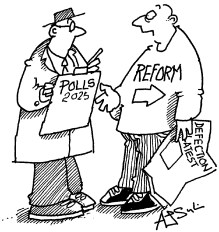
Kruger’s argument is that the space vacated by Christianity in Britain risks being crowded out by different religions – including Islam. The right policy response, he suggests, is restricting mass migration and encouraging proper integration of existing communities. ‘We shouldn’t be pusillanimous in the face of what’s quite an assertive strategy of more radical Muslim groups to extend their reach of their activities in our communities. So we should have second thoughts about approving mosques, certainly about the extensive practice of Islam in public institutions, including schools.’
Plenty of figures have fallen out with Farage over the years – including, most recently, Rupert Lowe, the ex-Reform MP. Is Kruger concerned the same might happen to him? Diplomatically, he suggests the blame lies with others. ‘There does seem to be a bit of a pattern of people who, for one reason or another, don’t seem to acknowledge his leadership. That may well be the source of the problems he’s had. I don’t know exactly what’s going on there, but I am very clear who the boss is here.’ His message is that ‘the old Brexit wars are over’. ‘You’ve seen Nigel having dinner with Dom Cummings. Everyone who is serious about this country and about the changes that are needed, whether they’re in the Conservative party, Reform, which wing of the Brexit campaign – we’re all really on one side.’
As Kruger heads off to his next appointment, he muses on whether Edmund Burke would be a Reformer or a Tory. ‘When there was a meaningful crisis, he was a fighter. You know, he didn’t stint in his opposition to the French Revolution… He wanted full-on war, and was furious when we declared peace with revolutionary France. Ultimately, he stood on principle and backed the people he thought would make the changes that were needed. So yes, I think he’d be with Nigel.’ As he departs, Farage wanders around the office, chuckling over party membership figures. He has good reason to smile: more and more Tories seem to share Kruger’s conclusion about the destiny of the British centre-right.

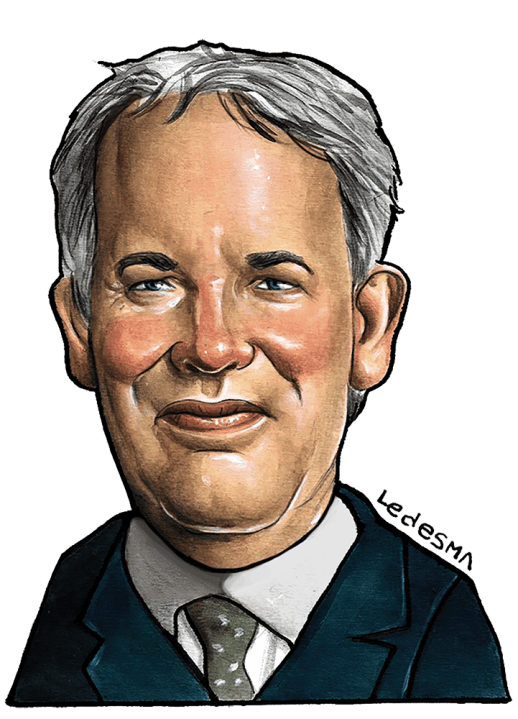

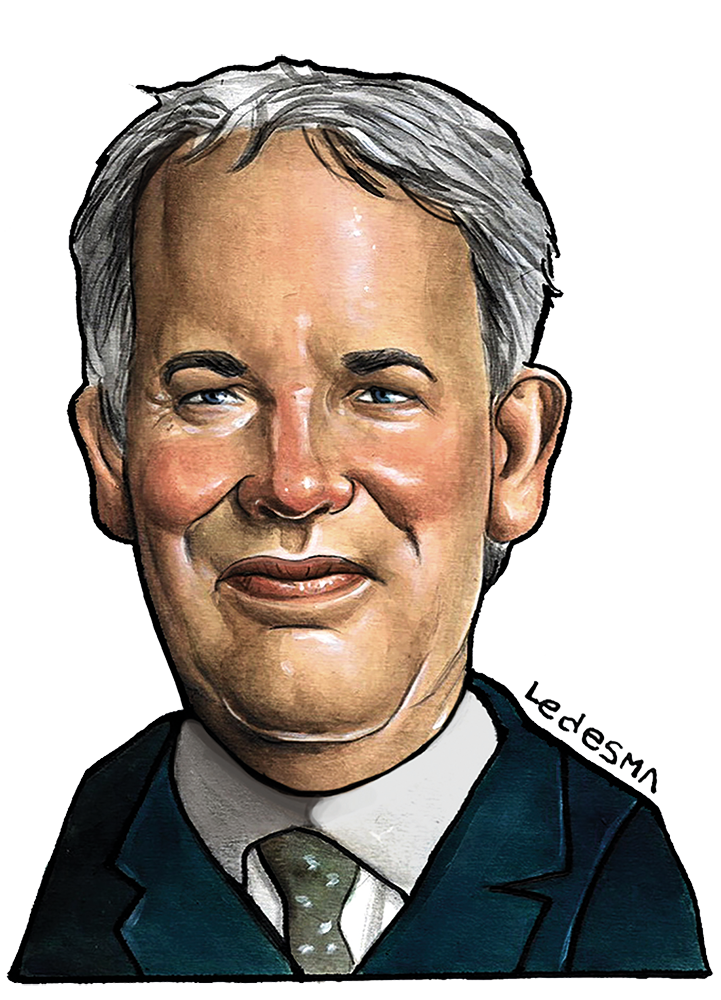
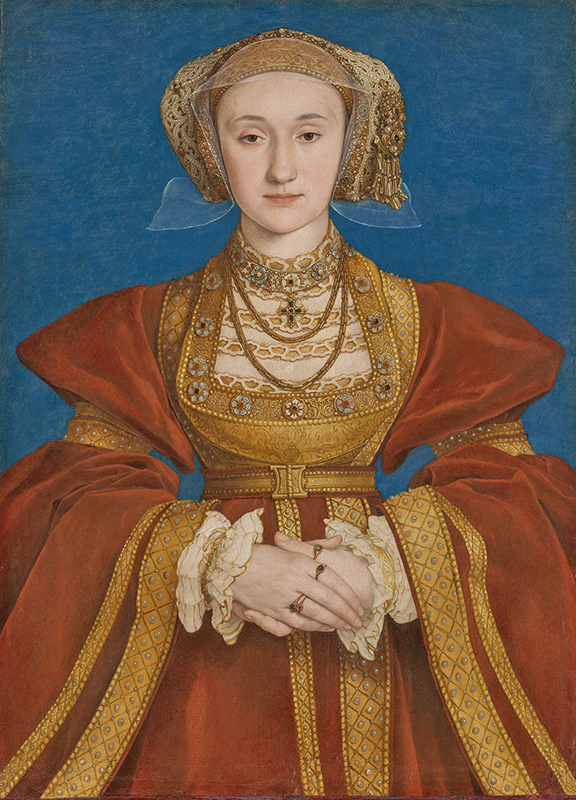




Comments